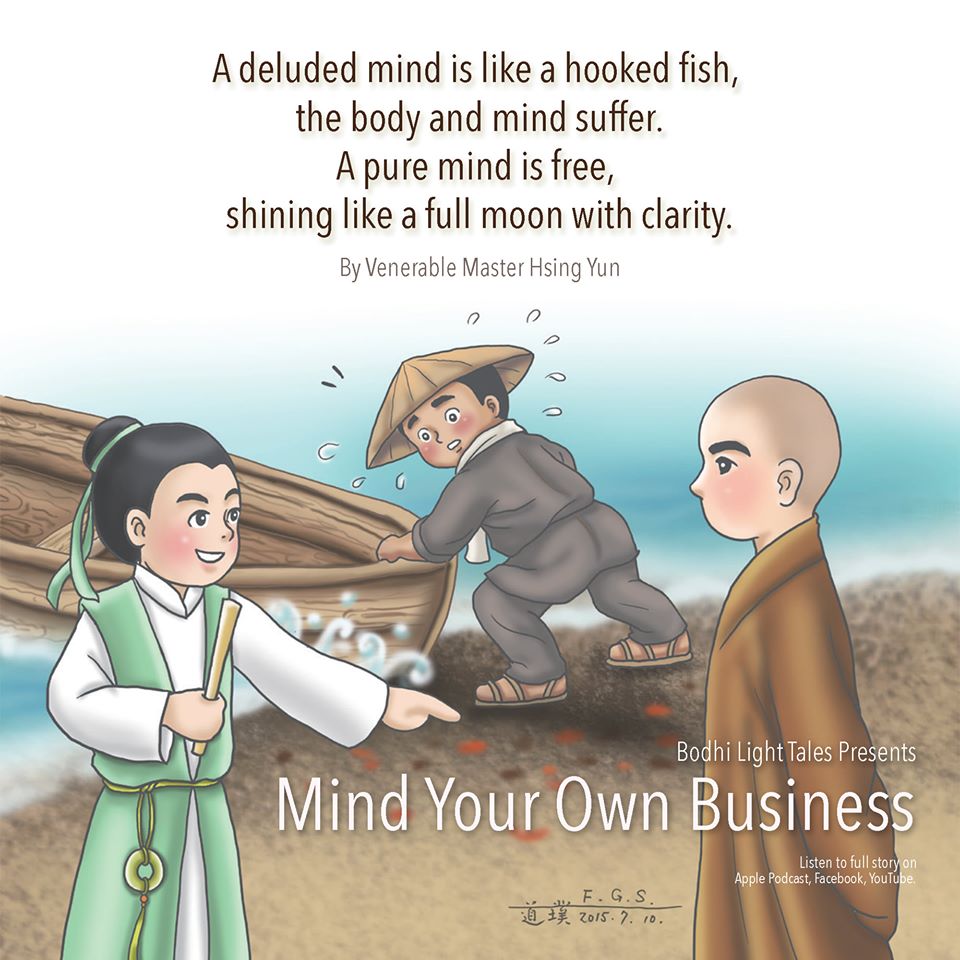Humble Table, Wise Fare
Cherish your blessings and be frugal. Do not buy things thoughtlessly or indulgently.
News
Mind Your Own Business
Find out the answer in this podcast episode : https://bit.ly/31p0A1C
Bright and early each morning, at the riverbank, a group of people waited to cross the river by boat. Sam, the ferryman, was in charge of sailing the boat across the river every morning.
One day, Sam overslept and started work later than usual. A frequent passenger greeted him, “Morning Sam!” and smiled, tapping his finger on his watch to show him that he should hurry and get ready.
To get the boat ready, Sam had to push it through sand, and into the river. While pushing the boat into the river, all manner of sea creatures such as shrimp, crabs, and even fish would be pushed out of the way, and some sadly ended up crushed by the boat.
Many people were waiting to cross the river, as the boat was small, Sam had to do a few round trips. Among the people left behind after the first group had left were a scholar and a Chan master.
Looking at the crushed sea creatures, the scholar asked the Chan master, “Master, did you see it? While pushing the boat into the water, the ferryman slaughtered so many lives. All these little fish, shrimps, and crabs were dead. Now, who's fault is it? Is it the passengers or the ferryman? In Buddhism, taking a life is an offense. Who will bear the bad karma resulting from this? Should it be the passenger or the ferryman?”
This is a difficult question to answer. If we say it is the fault of the ferryman, we must consider that it is for the sake of the passengers that he pushed the boat into the water. The crucial detail here is that the ferryman did so with no intention of taking lives. If we say it is the fault of the passengers, we must consider that they simply wished to cross the river, and once again, in doing so had no intention of taking lives. All things being equal, then who exactly is responsible for the loss of so many lives?
The Chan Master cleverly answered, “If this is the case, then it is your fault!”
On hearing this, the scholar became very angry and replied, “Why is it my fault? I am not the ferryman and have yet to board the boat as a passenger. How could this possibly be my fault?”
To teach the scholar an invaluable lesson, the Chan Master then said, “Because you didn’t mind your own business!”
This story highlights that the world itself is always at peace. However, many people are nosy busybodies who create unnecessary gossip. “Mind your own business” is a common saying that asks for the respect of other people's privacy. It also means that people should stop meddling in what does not concern them.
In Buddhism, it states that all karma created has been initiated by the mind. Our mind is the source of our actions. In Chan Buddhism, there is a concept known as “no-mind.” “No-mind” refers to the absence of both aversion and desire in the mind. While one continues to deal with difficulties as they arise in daily life and the mind, one can deal with them without craving, anger, attachment, or vexation. It is important not to confuse “no-mind” with a careless mind. With a mindset of “no-mind,” one can be rid of illusions and discriminations, with one’s mind at peace and in balance. All wrongdoings will subside, and one will naturally become at ease and untroubled.
In this story, the scholar’s question over who is guilty of killing the sea creatures is an example of the incessant mental chatter in our minds. This chatter and unnecessary spread of our thoughts from a single observation pave the way to suffering. This is because our negative thoughts and emotions are triggered by external objects. Our mind is then drawn to the vicious cycle of perceptions about past, present, and future experiences gained from our senses. These senses are based on our inner urges of desire, egotism, and wrong views.
As the Buddha said, “The secret of health for both mind and body is not to mourn for the past, worry about the future or anticipate troubles, but to live in the present moment wisely and earnestly.”
Mindfulness and meditation can remedy this vicious cycle of thoughts created by our minds. Being mindful of the present moment and observing without discrimination, we avoid negative emotions and unnecessary suffering.
Just as Venerable Master Hsing Yun says,
A deluded mind is like a hooked fish, the body and mind suffer.
A pure mind is free, shining like a full moon with clarity.
OTHER LINKS:
OTHER LINKS:





